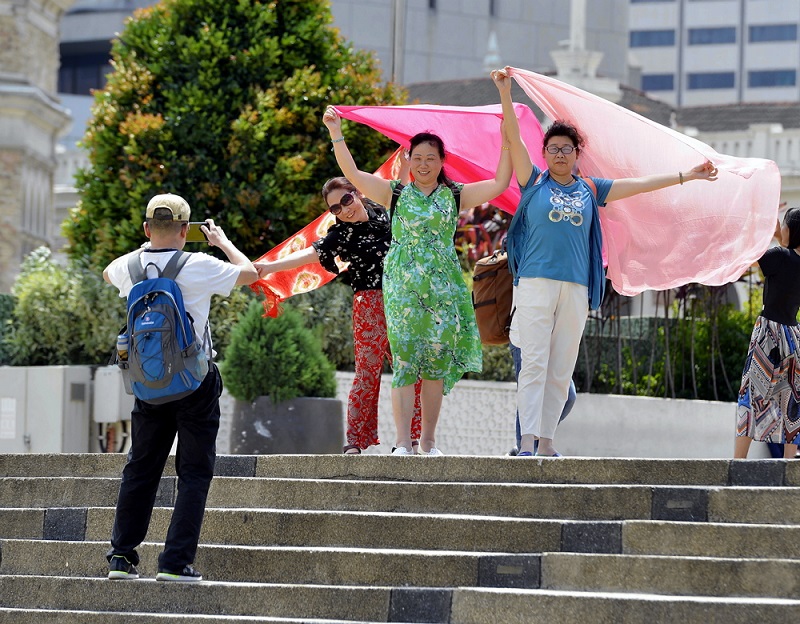KUALA LUMPUR, Jan 22 — Are China’s nationals increasingly being cast by some Malaysians as the new bogeyman to put disproportionate fear into fellow Malaysians?
Some analysts think this may be the case, citing the role of Malay right-wing groups allegedly playing up local racial unease and misinformation of illegal immigrants from China in attempts to dislodge the new Pakatan Harapan (PH) administration, against the backdrop of China being an economic and political superpower.

Prof James Chin, director of University of Tasmania’s Asia Institute, agreed that China’s citizens are becoming the new bogeyman in Malaysia, saying that an obvious reason for this situation is the “racial politics” in Malaysia.
“Putra or right-wing groups also paint non-Malays, especially the Chinese, as wanting to take over Malaysia, so using this fake news as an issue to drum up anti-Chinese sentiments. It’s all political, no truth,” he told Malay Mail when contacted.
He was referring to the controversial Malay party whose president and founder Datuk Ibrahim Ali is also the leader of Malay-Muslim rights group Perkasa.
“There is now a campaign to light up racial tensions to bring down the PH government. Too many things are happening to be a coincidence,” said Chin, who viewed efforts to paint Chinese nationals as the bogeyman through repeated raising of fears of those illegally present in Malaysia as part of efforts to stir up racial tension here.
Over the past year, Malaysian authorities have been forced to deny and refute various wild claims regarding Chinese nationals, including a rumour in August 2019 of three million citizens from China slipping in unauthorised during a system breakdown at KLIA.
But the Immigration Department later said that manual checks were carried out on all foreign visitors during the system glitch in line with its standard operating procedure, and that the system had been restored.
Another example was Malay party Putra’s vice-president Datuk Hamidah Osman who in May 2019 reportedly claimed to have heard that more than 100,000 Chinese nationals allegedly obtained Malaysian citizenship under the PH government, a spurious claim which was quickly debunked by the Home Ministry which revealed that only 37 of individuals originally from China had obtained Malaysian citizenship since the PH coalition became government on May 10, 2018 until May 15, 2019.
But just yesterday, Tan Sri Rais Yatim from ruling coalition component Parti Pribumi Bersatu Malaysia, also complained about the long-term multiple entry visa for Malaysians visiting China, claiming that Chinese citizens may use this as a means to settle in Malaysia.
Chin indicated that fears of Chinese nationals acquiring Malaysian citizenship or staying in Malaysia illegally were overblown in reality, when cross-checked against statistics.
He said the Chinese nationals were being singled out over rising concern on illegal immigrants, pointing to data that showed their numbers were lower compared to undocumented individuals originating from other countries such as Indonesia.
“Basically the issue of Chinese immigration is all hogwash. It is not possible for the Chinese to get citizenship or PR in Malaysia. They can only get Malaysia My Second Home visa which is only valid for 10 years.
“There are of course some who pay to get fake PR but the numbers are small. You have to remember that even if they come here, Malaysia is used as a stepping stone, most of them do not plan to live here forever.
“Many of these right-wing groups are associated with Umno or PAS so we should not be surprised by them using this issue to drum up support,” he said, noting the danger that some Malays would believe such claims and opt to take up vigilantism against illegal immigrants.
“The point is all these racial stuff will get worse until the PH government cracks down on these groups. It is clear some of them have broken laws. We also need a hate speech law. You can see these groups are now using CNY decorations as an issue in Puchong, they just want to raise the political temperature up — Malays vs Chinese,” he said when referring to a recent controversy over cultural festival Chinese New Year decorations in a school, suggesting that such actions could be considered as inciting racial hatred.

As for Malaysians’ sentiments towards China’s citizens, Chin said this is clouded and defined by their respective race and religion, suggesting that the Malays would look at Chinese nationals in a kinder light if they are Muslims, and would accept them temporarily staying in Malaysia.
Chin said the Chinese Malaysian community does not have a strong feeling either way, with most able to see that Chinese tourism brings economic benefit but with most not likely to agree to give them the right to stay.
“Most Malaysians see China as both threat and opportunity — they know we have to deal with China but we are also scared that China will dominate us,” he said, referring to concerns of both economic and political dominance by China.
“So there is no single set of feelings towards the Chinese. Also the feelings of the Malay population is always clouded by China’s treatment of its Muslim population,” Chin claimed.
In a survey by Singaporean think-tank ISEAS-Yusof Ishak Institute released last week, many Malaysians surveyed viewed China as the most influential economic power compared to the United States, as rivalry between the two superpowers continued to heat up.
But respondents from Malaysia were also overwhelmingly worried of China’s growing regional political and strategic influence in the country, with 80.9 per cent stating so.
Beijing has faced international condemnation, and protests from Muslim groups here, for rounding up an estimated one million Uighurs and other mostly Muslim ethnic minorities in internment camps in the north-western region of Xinjiang.
Blurring of anti-Chinese sentiments
Prof William Case of the University of Nottingham Malaysia said the only surprising aspect of this “nativist enmity” was how long it has taken to set in, pointing at the festering anti-Chinese sentiments since the May 2018 elections when Barisan Nasional became the default Opposition after losing to PH.
“Anti-Chinese sentiments have been on the boil since the last election, the fall of Barisan, and the emergence of what is disparaged by many as Pakatan’s ‘Chinese government’,” he said, alluding to the fairly large number of key ministries and other offices led by DAP members.
The DAP is a multiracial party that continues to be labelled as Chinese by its political rivals.
“But Pakatan seemed able at the same time to promote and quarantine its extensive dealings with mainland China, even in the face of mounting evidence of severe mistreatment of Uighurs.
“Though Malaysia’s government has been highly vocal, of course, in its criticisms over Palestinians, Rohingya, and Kashmiris, it has remained pragmatic, even mute with regard to Xinjiang, citing the importance for Malaysia of mainland investment flows and export markets,” said Case, who heads the university’s School of Politics, History and International Relations.
Case suggested that previously separate sentiments against local Chinese and citizens from mainland China appear to be increasingly mixed and generalised, saying that the clearest illustration of this is the speed at which angry rumours were taking hold.
“And social media users, of course, delight in fanning the flames with fake news,” he said, noting that the negative imagery generated by actual incidents of Chinese citizens in online scamming activities while in Malaysia is further heightened by “rumours and fake news over an increasingly nefarious mainland presence”.
“So, in a sense, the divergence in outlooks toward local and mainland Chinese is now being resolved, with ethnic grievances growing more generalised. The real test will come when, as Pakatan fears, mainland Chinese come to feel so unwelcome that their investment does indeed begin to dry up,” he said.
“Pakatan’s victory in the last general election, in seeming to make Bumiputera privileging less certain, triggered an ethnic backlash against local Chinese. At the same time, the new Pakatan government reengaged with mainland Chinese investment, restarting infrastructure projects (though on terms that remain opaque). I believe that PAS-controlled state governments on the East Coast sought also to increase mainland investment.
“But this dissonance in sentiments toward local and mainland Chinese seems now to be undergoing some ‘rationalisation’, with Bumiputera suspicions growing more generalised and consistent. This may be reflected also in Malaysia’s growing slightly more assertive lately with regard to the South China Sea,” he also noted.
UiTM Sabah political lecturer Asri Salleh said that the main reason why Chinese illegal immigrants or overstaying Chinese tourists are being singled out could be due to ill-behaving Chinese tourists leaving a bad impression on Malaysians.
He suggested that illegal Chinese immigrants “are the most visible due to the massive number of the Chinese tourists”, adding that “it all boils down mostly to negative perception Malaysians have about the Chinese illegal immigrants” and also noting that some would have trouble differentiating the illegal immigrants from tourists.
Delicate race relations
Peter Chang Thiam Chai, deputy director of University of Malaya’s Institute of China Studies, noted that China’s re-emergence as an economic powerhouse is as a whole positive but has some negative side-effects.
Chang noted that China’s preferred working partners when they began to invest in Malaysia were the local Chinese due to a shared culture and language, which then led to perception that China’s investments disproportionately benefit the Malaysian Chinese.
“In Malaysia, there is perception that China’s increased investment would disproportionately benefit some, while disadvantaging others, thus accentuating the pre-existing social economic divide along ethnic lines,” he said, pointing to the lingering perception that the socio-economic gap in Malaysia still cuts across ethnic lines and favour the non-Bumiputera.
Chang said the Immigration Department’s recent busting of online gambling syndicates masterminded by PRC or China’s nationals add to these negativities.
“The overstaying and illegal activities committed by Chinese citizens is staining China’s image abroad, undermining Beijing’s effort to maintain strong diplomatic, economic ties with countries in the region, including Malaysia.
“Most Malaysians at times cannot differentiate between the PRC Chinese and Malaysia Chinese. And these illegal activities committed by the former not only damages China’s reputation but can adversely affect Malaysia race relations,” he said.
“China must manage its growing presence in Malaysia with great care. Failure to do so can cause a fracture to Malaysia’s rich yet fragile multi-cultural, multi-ethnic landscape,” he added.




















